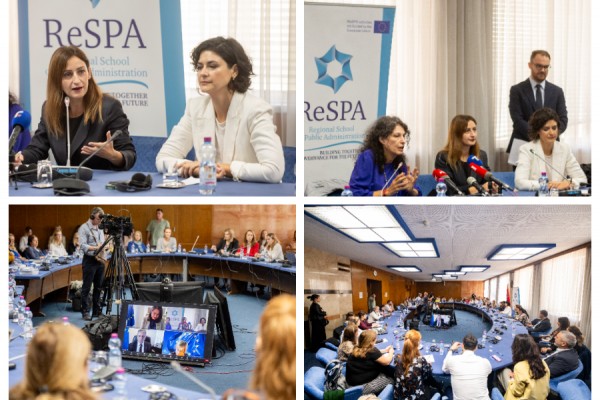
ReSPA Marked the European Day of Languages by Organising the Western Balkans Conference on the Translation of "Acquis"
Palace of Serbia, Belgrade, Serbia
As part of the European Day of Languages initiatives across Europe, ReSPA organized a regional conference on the "Preparation of the national version of the “Acquis", to assist teams within the public administrations in ReSPA Members in making progress toward translating the acquis into their respective official languages. The significance of this initiative was underscored by the presence of high officials at the conference, who shared their perspectives on the importance of the event:
Mila Ćipović-Gligorić, Head of the Division for the preparation of the Serbian version of the acquis greeted the audience on behalf of Tanja Miščević, Minister of European Integration and pointed out that multilingualism is a fundamental aspect of the EU, woven into its core principles. This ensures that EU citizens have the legal certainty to communicate with the EU institutions in the official language of their country. All legally binding EU acts are processed in the official languages of member states. EU candidate countries must also draft their national regulations before joining the EU, which is a demanding and extensive task requiring a systematic and centralized approach.
Plamena Halacheva, Deputy Head of EU Delegation to Serbia expressed gratitude to the organizers and participants for their shared commitment to this vital topic. Halacheva quoted Umberto Eco, stating that the language of Europe is essentially a language of translation. She emphasized the importance of the Western Balkans preparing national versions of EU regulations in a systematic and centralized manner during the EU accession process. She considered this conference as evidence of the region's dedication to addressing this issue properly and reiterated the invigorated accession momentum in the Region.
Maja Handjiska-Trendafilova, ReSPA Director stressed that the accelerated accession process of the Western Balkans to the European Union necessitates efficient translation and communication of the Acquis into their official languages. She expressed satisfaction that ReSPA had brought together key players from the region to work on the translation of EU regulations on the European Day of Languages. Handjiska-Trendafilova pointed out that "Notwithstanding the various challenges associated with the translation and transposition of the acquis that relates to its constantly growing volume, scope and complexity - the consistent, standardized and quality-assured translation is a crucial step in our EU integration processes. As skills and quality remain essential for achieving excellence in translation, ReSPA is honoured to support the regional peer exchange and learning agenda in this important area. This conference is just a first step in the more long-term, multi-modal capacity-building training and exchange of experience at the regional level. In just a few days in ReSPA Campus, together with DG Translation, we will host the region’s practitioners in an effort to connect, network and strengthen the capacity of teams working on the preparation of national versions of EU Acquis, whereby ReSPA confirms its active role in this process."
Christos Ellinides, Director-General for Translation, European Commission highlighted that the extensive process of translating EU regulations into the languages of member countries ensures that citizens, businesses, and economies can interact with EU institutions in their national languages. This promotes equality and respect for all EU citizens. However, to make this work in practice, the EU needs to provide administrative capacities, and the Western Balkans should follow suit. Director General Ellinides praised ReSPA as a regional partner and reiterated the full support of his team for the deployment of the multimodule capacity building programme on translation of the acquis that DGT will deliver to translation teams from the Western Balkans.
An inspirational talk was held by the former Director for Western Balkans in DG NEAR, currently Director General for Interpretation, Genoveva Ruiz Calavera, who recognised the importance of knowledge and experience sharing among the region itself and among the region and the EU institutions. She stated that currently the region is working more and more closely with the EU institutions and this is beneficial for both parties. Ms Calavera praised the values of multilingualism equaly important for the EU and the Region.
The conference opening and keynote remarks were followed up by panel discussions and presentations by public servants from the ReSPA Members on the overview of their respective administrations' progress in translating the EU Acquis, achievements so far, challenges and future plans, fostering a constructive dialogue among participants to share best practices and address common issues. A specific panel discussion was devoted to quality assurance in the translation process where good practices were debated among participants.
“EU Acquis” refers to the extensive body of EU legislation, norms, and policies that Member States and candidate countries must adopt and implement to ensure a unified legal framework. These regulations cover a wide spectrum of areas, ranging from trade and competition to environment and human rights. As the EU continues to expand and diversify, ensuring accurate and comprehensive translation of this legal corpus has emerged as a critical undertaking. The translation of the Acquis in the Western Balkans holds immense relevance in the context of the region's European integration aspirations. In the process of achieving harmonious integration in the European Union, the translation of the Acquis plays a pivotal role.
The Conference aimed to enhance the translation capabilities of ReSPA Members, ensuring that the Acquis is translated accurately and consistently despite the linguistic diversity in the region.



